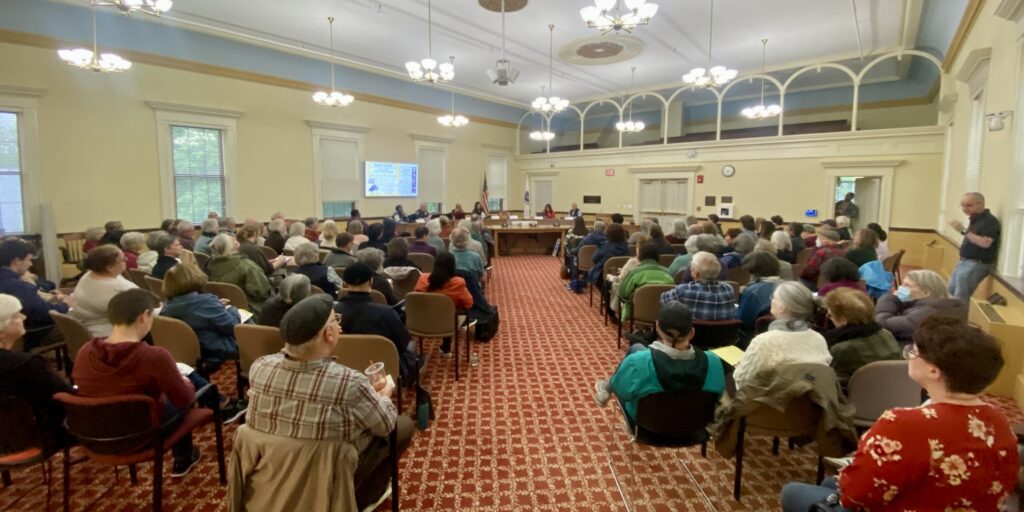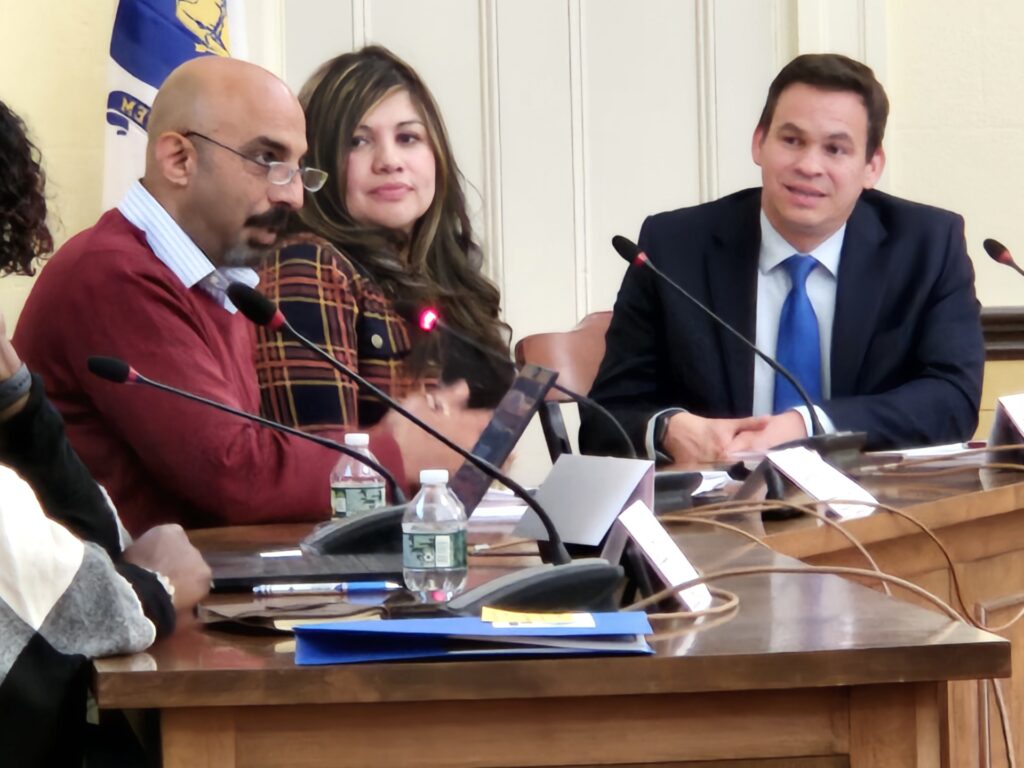On the evening of May 21, 2025, the Acton Democratic Town Committee (ADTC) convened a packed Community Forum on Immigration, responding to a surge in Immigration and Customs Enforcement (ICE) raids in Acton and nearby towns that has shaken this small, diverse Massachusetts town. Just ten days earlier, ICE arrests in Acton prompted hundreds of residents to rally in solidarity with their immigrant neighbors on May 11. The May 21 forum, held inside Town Hall, brought together state and local leaders, legal experts, and grassroots organizers to chart a path forward amid mounting fear and uncertainty.

Sahana Purohit, ADTC Chair, opened the evening with a sobering message: “The past few weeks have witnessed a disturbing increase in ICE raids across the state and nation. Here in Acton, we have seen firsthand the trauma and disruption these actions cause.” She described how, within 24 hours of the recent arrests, Acton residents organized a peaceful rally outside Town Hall, drawing hundreds in a show of unity and support.
“Our immigrant families are not just neighbors — they are vital to Acton’s economy, schools, and culture,” Purohit said. “We are here tonight to stand with them and to ensure everyone knows their rights.”

Understanding the Immigration System
Eloa Celedon, an immigration attorney from Celedon Law, began by demystifying the complex U.S. immigration system. She explained that immigration courts operate within the Department of Justice, separate from ICE, which is part of the Department of Homeland Security (DHS). DHS also oversees Customs and Border Protection (CBP) and U.S. Citizenship and Immigration Services (USCIS).
Celedon outlined the typical scenarios that put immigrants at risk: “Historically, ICE has focused on individuals with criminal records, such as DUI [Driving under the Influence of drugs or alcohol) or domestic violence charges. But now, we’re seeing people without any criminal history being targeted — those who overstayed visas or entered without inspection, sometimes decades ago.”
Many of those most at risk, she explained, are people who entered the U.S. 20 or 30 years ago and were, at the time, advised not to appear for their immigration court hearings. “They were told, ‘If you go, the judge will deport you.’ But now, failing to appear leads to an ‘in absentia’ removal order, making them a priority for ICE.”
Celedon stressed that these individuals are not criminals. “There are legal remedies — motions to reopen cases, requests for asylum, or the ‘10-year law’ for cancellation of removal. But people need legal representation and accurate information.”
The Human Toll
State Representative Danillo Sena brought a personal perspective to the discussion. “When Trump got elected, we knew we needed to do an immigration forum. But after the raid in Acton, it became urgent.” Sena, himself an immigrant who arrived in Acton in 2001 from Brazil and later became a Deferred Action for Childhood Arrivals (DACA) recipient, described the fear gripping his constituents.
He recounted a recent case: “A friend of mine, an electrician, was a passenger in a car pulled over for speeding. An ICE officer questioned him about his status and sent him to Plymouth [County Correctional Facility], even though he had no criminal record. We’re seeing more and more cases like this.”
The first Brazilian immigrant elected to a state legislature in America, Rep. Sena highlighted legislative efforts underway, including the Safe Communities Act, the Dignity Not Deportation Act, and a $5 million legal defense fund recently passed by the House. “We need to ensure due process for everyone,” he said. “My office has helped constituents find attorneys, write support letters, and work with federal officials to expedite cases. Immigration is now one of the top concerns in our district.”
The Federal Policy Shift
Sarang Sekhavat, Chief of Staff at the Massachusetts Immigrant and Refugee Advocacy Coalition (MIRA), provided historical context. “Immigration enforcement used to be about labor and economic need. After 9/11, it shifted to national security.” He traced the evolution of enforcement, from the Bush-era Special Registration program targeting Muslim men to today’s expansion of expedited removal.

“What we’re seeing now is the Trump administration ramping up enforcement against everyone, not just those with criminal records,” Sekhavat said. He criticized the administration’s claims of targeting criminals: “If that were true, why are they shifting resources from criminal to civil law enforcement?”
Sekhavat warned of the dangers of expedited removal, which allows the government to deport anyone present for less than two years, without a trial. “This was supposed to be for border cases, but now it’s being used nationwide. And funding for legal services, even for unaccompanied minors, has been slashed. The administration expects two- and three-year-olds to represent themselves in court.”
He noted that states are fighting back, filing lawsuits to block federal threats to cut funding for non-cooperation with ICE. “It’s a dangerous precedent,” he said. “Congress already allocated this money, but the administration is using it as leverage.”
Local Law Enforcement’s Role
Acton Police Chief Jim Cogan addressed the community’s concerns with candor. “I’ll be honest – I’m a little nervous. A lot has happened since I accepted this invitation.” He described his efforts to learn from colleagues in surrounding towns and the May 10 incident.
Chief Cogan emphasized the Acton Police Department’s commitment to impartial service: “Anyone who needs assistance from Acton police will receive it, regardless of immigration status. We do not collect information about anyone’s status. Our mission is to protect everyone in our community.”
He explained the legal framework following the 2017 Massachusetts Supreme Judicial Court decision in Commonwealth v. Lunn, which prohibits local police from holding individuals solely on a federal civil immigration detainer. “If someone is arrested for driving without a license and is undocumented, their fingerprints go to criminal justice agencies, including ICE. If ICE wants them for a civil detainer, we notify them, but we cannot hold the person without a judicial warrant.”
Cogan cautioned against interfering with ICE operations: “Don’t put yourself at risk. If you see something, record details—who did it, what car they drove—and report it to us. We can’t obstruct federal agents, but we also don’t participate in civil enforcement.”
He described the department’s response to the May 10 ICE activity: “Our presence was to ensure the situation remained peaceful and everyone’s rights were respected. We are committed to transparency and engagement.”
Grassroots Organizing and Support
Dálida Rocha, Executive Director at Neighbor to Neighbor and a leader in the LUCE Immigrant Justice Network, described the growing need for community support. “I feel like I’m in Acton every other day now,” she said. LUCE, a coalition of grassroots organizations, operates a hotline and trains volunteers to monitor ICE activity and ensure rights are respected.
“When ICE sightings happen, our verifiers show up to record what’s happening. It’s your constitutional right,” Rocha explained. “We’re not there to interfere with arrests, but to make sure no one’s rights are violated.” The LUCE hotline is 617-370-5023.
LUCE also provides practical support: connecting families with legal help, providing food, fundraising for rent, and supporting those detained. “There’s a lot of trauma,” Rocha admitted. “We see how our immigrants are being criminalized. The need for our services has only grown.”
She announced an upcoming LUCE hotline training session, sponsored by the Peacemakers Network and Indivisible Acton Area, to teach residents how to safely observe and document ICE activity and support affected families.
After the Raids: Detention, Transfers, and the Struggle for Due Process
With the panelists’ opening remarks concluded, the forum moved to the question-and-answer session. Bob Ferrara, the co-moderator, read the question: “Following ICE arrests in Acton just 10 days ago, what do we know about the individuals detained, what happens to them now, and how can community members provide support or advocate for their release and rights?”
Attorney Celedon, who is representing at least one of the individuals, described the standard process: detainees are first brought to ICE’s Burlington office for booking, but most are quickly transferred to the Plymouth County Correctional Facility — often alongside people accused or convicted of crimes, which can be particularly traumatic for those with no criminal record. Detainees are frequently moved again, sometimes within 24 hours, to facilities in other states such as Louisiana, Mississippi, Texas, or Ohio. Celedon noted that this constant relocation, which she called “detention hopping,” leaves individuals isolated and frightened, far from family and legal support.
Alissa Nicol, Vice Chair of the Acton Select Board and one of the people who saw the federal immigration enforcement operation in Acton on May 10, shared the following information: “The men who were apprehended here in Acton on May 10 have been sent to Louisiana and Virginia and are in prison. They were separated. The three men are father and sons; they’ve been here since 2017 and 2019.” She also mentioned a GoFundMe page created by Katie Orellana, the girlfriend of one of the men.
Rocha pointed out that sending detainees to states like Louisiana is strategic, as judges there are known for imposing higher bonds and moving cases more quickly toward removal.
Sekhavat said that private corporations profit from running detention centers and lobby for policies that increase detention capacity. He said the current congressional budget proposes expanding detention beds to unprecedented levels, benefiting these companies financially.
Know Your Rights and Take Action
The forum’s Q&A session also focused on practical steps residents can take. One question asked how to confirm if someone is a real ICE agent. Chief Cogan explained that while Acton police must provide identification upon request, he wasn’t sure if ICE had the same policy, but advised that it was good practice to ask for ID.
Panelists reiterated the importance of knowing your rights: everyone, regardless of status, has the right to remain silent, the right to refuse consent to a search, and the right to legal representation. “Don’t open the door unless ICE has a signed judicial warrant,” Attorney Celedon advised. “Ask to see it—through a window or under the door. Don’t sign anything without a lawyer.”
Rocha encouraged residents to attend LUCE training and get involved: “We need more verifiers, more people willing to stand up and support our neighbors. This is about community care.”
Looking Ahead
As the evening drew to a close, the sense of urgency and solidarity was palpable. “We are in a moment of crisis,” said Purohit. “But we are also in a moment of community. Acton has shown that we will not stand by while our neighbors are targeted. We will organize, we will educate, and we will defend the rights of all our residents.”
Rep. Sena echoed the call to action: “This is not just about laws and policies. It’s about people—our friends, our families, our neighbors. We have to keep fighting for justice and dignity for everyone.”
The forum ended with a standing ovation for the panelists and a sense of renewed commitment from the audience.
Residents who didn’t make it to last week’s event can watch “Community Forum on Immigration – May 21st, 2025” on ActonTV.
Greg Jarboe writes on a variety of topics for the Acton Exchange. He is a former editor of the Acton Minuteman and a former chair of the Acton Select Board, and a current member of the Acton Finance Committee, Public Works Facility Committee, and the Economic Development Committee.













